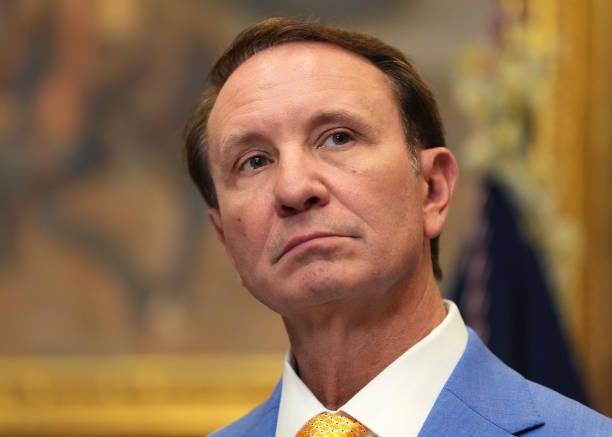
March 29th is election day, folks. As you’ve probably heard, there are four potential changes to the Louisiana constitution.
Governor Jeff Landry has been buzzing around the state promoting these four changes, so I had him on to give him a chance to unpack these issues for our listeners.
The bulk of our conversation centered around Amendment 2, which Landry is very bullish on.
In terms of the broader reasoning behind the creation of the amendment, Gover Landry says, “Over the last couple of decades, we've all had our frustration with the way that our state government operated when it fell into dire fiscal needs, and we've had these starts and stops in our economy. We've seen people leave the state rather than come to the state.”
It’s a sad and serious truth. In 2024, nearly two-thirds of Louisiana's Parishes saw population decline, a stark difference from many other Southern states.
Landry commented on this, saying, “We've questioned why other states in the South have received new types of economic development projects, such as in the automotive industry or airline industry. We've seen places like South Carolina attract Boeing, BMW…And we scratched our heads and said, well, why can't Louisiana?”
Landry explains how this conundrum spurred these proposals to the tax code. “We worked all last year to put ourselves in a position to attract those kinds of projects," he says. "And we're seeing the fruits of that labor. And one of the biggest problems we've had is our tax code, and we wanted an opportunity to give our citizens a tax cut and put ourselves on our way to making it business-friendly. And Amendment 2 does a lot of those things.”
The governor summed up Amendment 2, expressing that there's something for everyone tucked into the 115-page bill.
“It reduces the state income tax,” Landry says. “It gives the state flexibility to increase funding on infrastructure by basically combining a number of the dedicated savings accounts that we have set up and are unable to use. We use some of those savings accounts to pay down debt, instead of moving money to New York banks to the tune of $300 million a year. We then take that money and give teachers a permanent raise. We double the deduction for our senior citizens, helping keep them in our state. We do about 30% of the things we wanted to do in rewriting our constitution to again, create more flexibility so that we can grow our economy.”
Of course, with any ballot issue, there’ve been critics. Landry shared his feelings about those who doubt the amendment. He says, “I hear all of this kind of ankle biting, oh, we're watering down tax (exemptions) for religious organizations, which is not true."
There've also been questions around the homestead exemption, which policy experts have explained won’t be eliminated with the passage of Amendment 2.
One of the governor’s largest advocacy points was an emphasis on flexibility, and how the state’s difficult revenue structure has made it hard to adjust during harder economic periods.
Amendment 2, according to Landry, will ease this burden, allowing the state to make more calculated tax cuts instead of slashing healthcare and education. He says, “And by opening and combining some of those funds and streamlining the financial affairs of the state, we get to look across the board and quit going to just education and healthcare. And I do believe that once we pass this amendment, it’ll give us the momentum for the legislature to start looking at other dedicated funding sources and saying, okay, do we have too much money in those accounts under which we can find and use that money elsewhere?”
The governor explains the bill could put momentum behind even further tax cuts, ultimately achieving his goal of eliminating the income tax. He says, “I do believe if we pass this amendment and there's a spending cap limit in this amendment… that we literally could get to the point where in two years we're further reducing people's income tax… My goal is to get rid of the income tax.”
Governor Landry expresses the need to merge business growth with more economically favorable tax policy as the foundation for reversing Louisiana’s population crisis. This, he says, has been his approach throughout each legislative session.
“So let's look at what we did in the last session,” Landy explains. “We got rid of the corporate franchise tax. We lowered the corporate income tax. We guarantee the lowering of our personal income tax with a vote yes on Saturday. What we do is start to remove some of the exemptions from the sales tax. And then, of course, we ended up with a recent sales tax. So what we did was we quit taxing people's labor and we started taxing choices, their consumption.”
Landry also commented on the constitutional implications of the amendment.
Our constitution has been amended like 329 times,” Landry says. “This amendment doesn't delete any laws, it doesn't take off the books anything that's inside of the current constitution. It simply moves those things from the constitution into a superset of statutes that require a two-thirds vote…There's still an extra layer of protection for those things. People may say, well, I don't know if I want the legislature to be able to amend these things by a simple majority."
“That was the whole debate that we had last year in wanting to rewrite a large section of the Constitution," Landry says. "We didn't want to take things out of the constitution and throw them in the trash can. We just wanted to place them into a super set of statutes so that the legislature could have the flexibility to do it by two-thirds vote if times changed and priorities change.”


